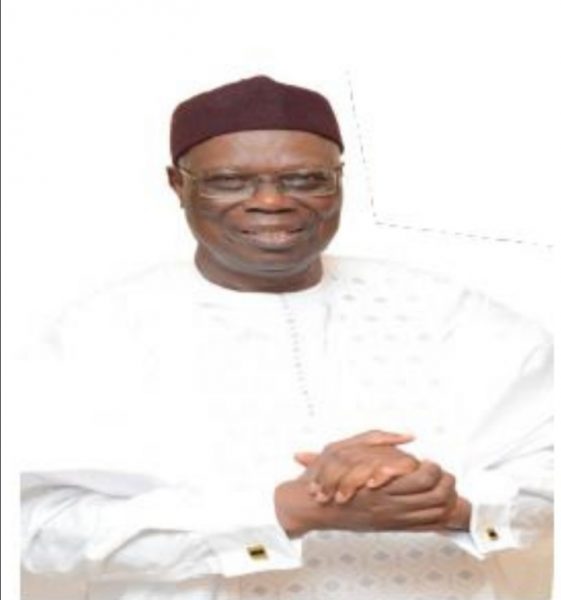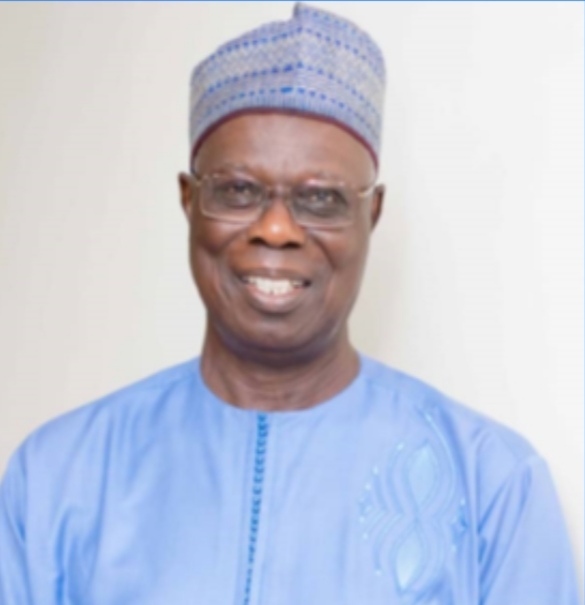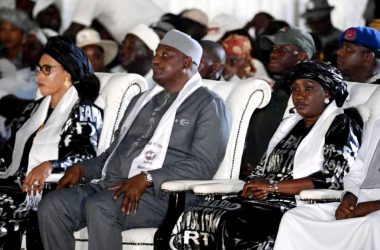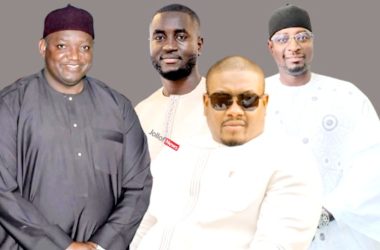
Political Career: BB Dabo’s political activism started in the 1960s through 1994. He was formally admitted into the People’s Progressive Party (PPP) led by Sir Dawda K Jawara in 1979.
During BB Dabo’s membership of the PPP, he held many important positions which are too numerous to list here. Suffice it to say, BB Dabo was a key and committed member of the PPP until the party was banned in 1994 by Yahya Jammeh and his military junta and, he continued the struggle to rebuild the PPP when the ban on political activity in the Gambia was lifted in 1997. He continued these efforts until he was given little option but to form, with like-minded Gambians, the Gambia For All party (GFA) in 2020.
All through his political activism and career, BB Dabo’s primary focus has always been and continues to be, to see democracy take root in The Gambia and, for uplifting the living conditions of ordinary Gambians to a better standard. It has never been about himself, a fact that many Commissions of Inquiries setup by both the Jammeh and Barrow Administrations manifested.
BB Dabo played an extremely important role in driving Kukoi and his gang out of the country and thereby helping restore legitimacy and the return of Sir Dawda to power. In recognition of the competence and the commitment BB displayed throughout the Kukoi crisis, Sir Dawda recalled him from Senegal and gave him a ministerial position in his cabinet in 1981.
In 1982, BB Dabo was elected to Parliament, representing Kiang West Constituency. He successfully won and represented this constituency in successive elections until 1994, which reflected the trust and confidence that existed between the people of Kiang and their Member of Parliament.
As testament to the confidence Sir Dawda had in BB Dabo, he appointed him as Vice President of The Gambia for ten years, from 1982 – 1992. Additionally, during this period BB Dabo also held many other ministerial portfolios in challenging sectors requiring, in some cases, major reforms to improve performance and service delivery. These included:
Information and Tourism for 9 months. This Sector was seriously affected during the 1981 crisis because of the negative images coming out of the country and BB Dabo and the officials of the Ministry of Tourism embarked on a massive publicity campaign to convince tourists to come back to The Gambia after they were terrorized by Kukoi and his gang. The common description of The Gambia as the “Smiling Coast of West Africa”, was coined as result of the efforts made by BB Dabo and his team to restore our economy after Kukoi’s disaster.
The Civil Service portfolio – BB Dabo held this portfolio for ten years and during this period he helped to improve capacity and performance of the civil service and the result was that The Gambian Civil Service during this time was one of the best in Africa. Many governments in Africa at the time sent representatives to The Gambia to understudy how our Civil Service worked so that they could model their civil service after it.
The National Education portfolio – BB Dabo held this portfolio together with that of Culture, Youths and Sports for 5 years. If you ask many Gambian teachers of this time, they generally say this was one of the most satisfying periods of their career. He introduced structural changes that allowed access to a greater number of Gambian children, reviewed the salaries and living conditions of teachers, including Quranic teachers.
As a result, the salaries of teachers were raised and measures were implemented to address challenging issues such as accommodation for teachers on posting in rural areas and timely payment of salaries. Overall, standards were very high, the teachers were treated fairly, were respected and competence and productivity were rewarded.
BB Dabo held the portfolio of Ministry of Economy & Public Finances for 2 years 6 months. The Gambian economy and trade in general flourished very much during this time to the extent that plans were drawn to adopt the Singapore development model for The Gambia. This plan was scuttled by the disastrous Yahya Jammeh takeover.
It is truly amazing the level of contribution BB Dabo made towards making The Gambia a better place for all her citizens. Based on these portfolios, it is easy to see that BB Dabo has vast experience and intimate working knowledge across key, if not all, sectors of government in The Gambia.
Through all these important responsibilities in government, there was never any scandal associated with BB Dabo. He was known for his hard work and, performed his duties exceptionally well with honesty and integrity and above all, with the interest of Gambians at heart.
It was under these circumstances that when Yahya Jammeh and his adventurists military colleagues illegally took over the government in 1994, that resulted in mounting international sanctions, that they appealed with BB Dabo to come back from Senegal, where he was with Sir Dawda and others, to help them run the country.
It would be recalled that the reason that Yahya Jammeh’s military junta gave for taking over the government was that Sir Dawda’s government was corrupt, even though this was later largely proven to be false by the Commissions of Inquiries that were setup by the junta to investigate these claims.
What Jammeh’s military junta did not know or perhaps miscalculated by offering BB Dabo the Finance Ministerial position, was that they thought he could be bought by the offer. They did not know that he is a man of principles and a patriot who loves The Gambia dearly. So, what did BB Dabo do when the military junta made this offer to him?
BB Dabo carried out a very wide consultation of Gambians both in The Gambia and out of the country at the time, including Sir Dawda K Jawara, about whether he should take the offer or not. The overwhelming advice received by BB Dabo at the time, was that The Gambia was in a very precarious state and therefore, for the sake of the country and her people, he should take the offer on condition that the Military Junta handed over the country to civilian rule in one year.
This acceptance of the offer was essentially a rescue mission for The Gambia, like the one he carried out successfully in 1981, thirteen years prior, with Kukoi Samba Sanyang and his gang that terrorized Gambians. Simply put, this is like a scenario where your home is on fire and, the question is whether you should fetch water and try to put out the fire, or just standby and let the fire consume your home?
The obvious answer to this scenario for any sane person is to fetch water and try to put out the fire! This was exactly what BB Dabo did. He accepted the Military Junta’s offer of Finance Minister position on condition that they would handover power to a civilian government in one year and the Jammeh Junta accepted that conditionality.
When BB Dabo returned from Senegal to take up the Finance portfolio in the Military government, he insisted that the one-year return to civilian rule be drawn and, he spearheaded the drawing of that Timetable. The Junta members later argued that the One Year timetable was too short for the Transition and that it should be extended to one year and six months which, was the final Timetable agreed for Civilian rule.
BB Dabo and his team worked diligently and within approximately 70 days, the transition to democratic rule timetable was presented to Yaya Jammeh and the junta for approval. Being insincere to the Civilian Transition rule, this timetable was rejected by the Military Junta and, consequently, BB Dabo resigned his Finance Minister position from the Military regime. As was their modus operandi, the junta made plans to hurt BB Dabo but thanks to Allah, he escaped their evil machinations and went into exile like many other Gambians.
In exile, BB Dabo never gave up the fight to remove the Dictatorship that Yahya Jammeh and his military junta established in The Gambia.
From 1994 through 1999: BB Dabo actively participated in coordinated efforts by UK-based West African exiles to draw attention to growing governance crises in their home countries that included countries such as Nigeria, Ghana, Liberia, Sierra Leone, and The Gambia and to advocate for increased democratic governance in these countries. During this time, BB Dabo advocated tirelessly to expose the excesses of military rule in The Gambia. Some of the efforts he made towards achieving this objective included, raising awareness among Gambian communities about deteriorating conditions back home, and to agitate for organised action.
BB Dabo played a key and leading role in organizing a Round Table Discussion on Gambia at the Foreign and Commonwealth Office in London.
From 2012 through 2016: After BB Dabo left the UN in 2011, he resumed his involvement in sensitisation campaigns regarding the worsened situation in The Gambia. Activities were stepped up to include:
lobbying support within the international community [UK Govt and Parliament, EU institutions, US authorities, UN etc.],
forging partnership with civil society bodies focusing on human rights issues [Amnesty International, Human Rights Watch, Commonwealth Human Rights Initiative etc] to alert public opinion,
participating in founding [and leading, in the position of Chair] the Campaign for Democratic Change – Gambia, an umbrella body put together to coordinate efforts of UK-based Gambians, and friends of The Gambia, for sustained and more effective campaign over the situation back home.
The campaign escalated beyond advocacy, by urging participants to take positive action in the form of agitation through street protests, notably in London and Brussels. BB Dabo actively took part in the campaign for example, by marching and speaking at length at meetings and symposia about the nature of the ‘appalling misrule’ Gambians experience on a daily basis, under the leadership of Yahya Jammeh and the APRC.
These activities were successful, because in March of 2012, “Twenty-six British MPs signed a House of Commons Cross Party Early Day Motion (EDM 2727), which calls on the UK Government to take diplomatic action and lead the international community in redoubling its efforts to ensure that The Gambia ends human rights abuses.
The EDM, tabled by Liberal Democrat MP Jo Swinson who doubled as the Parliamentary Private Secretary to UK`s Secretary of State for Business and Innovation Rt Hon Vince Cable, also expresses concern over the recent election that was boycotted by the Economic Community of West African States (ECOWAS) and heavily criticized by other observers.
The EDM notes the continuing reports from Amnesty International and others of increasing human rights abuses in The Gambia. It further notes that these abuses target perceived opponents of the government and that the right to a fair trial was routinely violated in Gambian courts. The Motion also recognized the commitment of the British High Commission in The Gambia in supporting human rights and congratulates the Campaign for Human Rights in The Gambia (CHRG-UK) for raising awareness of this issue”.
BB Dabo not only campaigned in the UK and EU, but he travelled on numerous occasions to the USA and rallied the opposition to Yahya Jammeh’s dictatorship in The Gambia.
In addition to organizing opposition to the brutal regime back home, he also helped mobilize funds that were very much needed for the fight to uproot the dictatorship. It was a culmination of BB Dabo’s efforts and those of many other Gambians that made the 2016 election victory a possibility, thanks to Allah.





